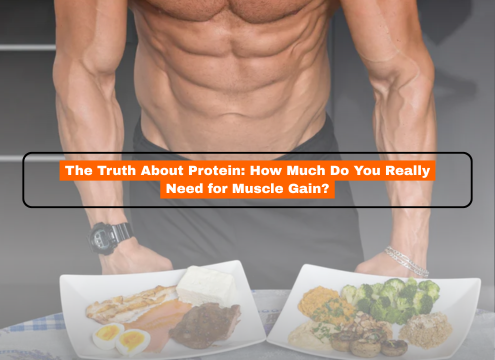Protein is one of the most talked-about nutrients in the fitness world—and for good reason. Whether you’re new to strength training or a seasoned lifter trying to bulk up, protein plays a central role in building and maintaining muscle mass.
But with so much conflicting information—ranging from protein-pushing influencers to low-protein fad diets—it’s easy to get lost in the hype.
So, how much protein do you really need for muscle gain? Is more always better? Do you need protein shakes? What type of protein is best?
Let’s cut through the confusion and get to the science-backed truth about protein.
Why Protein Matters for Muscle Gain
When you work out—especially strength training—you cause tiny tears in your muscle fibers. Amino acids, which are the building blocks of protein, are necessary for your body to heal these tears and grow stronger.
Here’s how protein helps in muscle development:
- Repairs damaged muscle tissue
- Supports growth of new muscle fibers (hypertrophy)
- Speeds up recovery post-workout
- Maintains muscle during fat loss
- Supports immune function and hormones during intense training
Even with intense training, your body cannot maximize muscle regeneration if you don’t consume enough protein.
How Much Protein Do You Really Need?
👤 Sedentary Adults
For someone who doesn’t engage in regular strength or endurance training, the Recommended Dietary Allowance (RDA) is:
0.8 grams per kilogram of body weight per day
This amount prevents deficiency but won’t support muscle growth.
💪 Active Individuals and Strength Trainers
To build muscle, maintain lean mass, and recover effectively from workouts, studies suggest:
1.2 to 2.0 grams of protein per kilogram of body weight per day
For example, if you weigh 70 kg:
- Minimum for active individuals: 1.2 × 70 = 84 g/day
- Maximum (for intense training or cutting): 2.0 × 70 = 140 g/day
🚨 Too much isn’t always better:
Eating beyond this range doesn’t lead to faster muscle growth. Your body only uses what it needs—excess protein is either converted to energy or stored.
How to Calculate Your Protein Needs
Let’s say you’re 70 kg (154 lbs), strength training 4–5 times a week. You want to build lean muscle.
A good range would be:
1.6–2.0 g/kg × 70 = 112–140 grams per day
That translates to ~30–35g of protein per meal across 4 meals/snacks.
Use this formula based on your goals:
| Activity Level | Protein (g/kg) | Example (70kg person) |
| Sedentary | 0.8 g/kg | 56 g/day |
| Light Activity | 1.0–1.2 g/kg | 70–84 g/day |
| Moderate Activity | 1.2–1.6 g/kg | 84–112 g/day |
| Strength Training | 1.6–2.0 g/kg | 112–140 g/day |
| Cutting Phase (with training) | 2.0–2.2 g/kg | 140–154 g/day |
Timing Your Protein: Spread It Out
Protein timing isn’t just for bodybuilders. Spacing your protein intake throughout the day helps your body absorb and utilize amino acids efficiently.
✅ Why timing matters:
- Enhances muscle protein synthesis (MPS)
- Reduces muscle breakdown
- Supports recovery and strength gain
Try to consume 20–40g of high-quality protein at each meal, particularly:
- Post-workout (within 1–2 hours)
- At breakfast (to break the fasted state)
- Before bed (to reduce overnight muscle breakdown)
Example day for 120g protein:
- Breakfast: 30g (e.g., tofu scramble + whole grain toast)
- Lunch: 30g (e.g., quinoa + lentils + curd)
- Snack: 20g (protein smoothie)
- Dinner: 30g (paneer stir-fry + rice)
- Before bed: 10g (Greek yogurt)
Quality Over Quantity: Choose Complete Proteins
Not all protein sources are equal. What sets them apart is the amino acid profile, especially the essential amino acids (EAAs) and leucine, a key trigger for muscle synthesis.
🔑 Complete Proteins (Contain all 9 EAAs):
- Eggs
- Dairy (curd, paneer, milk, cheese)
- Soy (tofu, tempeh, soy milk)
- Meat, fish, poultry
- Whey protein
🌱 Incomplete Proteins (Plant-based, missing one or more EAAs):
- Lentils, beans, chickpeas
- Nuts and seeds
- Grains (rice, oats, wheat)
However, you can still gain muscle by following a vegetarian or vegan diet. Simply blend matching plant proteins.
Example combos:
- Rice + dal
- Whole wheat bread + peanut butter
- Quinoa + beans
- Chana + millet roti
Do You Need Protein Supplements?
The short answer: Not necessarily.
Protein powders are convenient, but whole foods should be your foundation.It’s fantastic if you can satisfy your needs with food. But if you struggle to hit your target, especially after workouts or while traveling, supplements can help.
✅ Use a protein shake if:
- You’re on the go
- You have low appetite after training
- You need a boost since you eat a vegetarian or vegan diet.
- You must maintain your muscle mass because you are on a calorie deficit.
Top options:
- Whey protein (fast-digesting, high in leucine)
- Casein protein (slow-digesting, great for overnight recovery)
- Soy protein (complete plant-based option)
- Pea + rice blends (for vegans)
Common Myths About Protein
❌ Myth 1: “More protein = more muscle”
Truth: Once you meet your protein needs, extra protein doesn’t lead to extra gains. Training intensity, sleep, and recovery matter just as much.
❌ Myth 2: “You need protein right after your workout or it’s wasted”
Truth: Yes, post-workout protein helps, but you have a “muscle protein synthesis window” of 2–3 hours. It’s not a race against the clock.
❌ Myth 3: “Vegetarians can’t build muscle”
Truth: Plant-based diets can support muscle gain with the right planning and protein combinations. Many athletes thrive on plant protein.
❌ Myth 4: “Too much protein damages your kidneys”
Truth: In healthy individuals, higher protein intake is safe. This myth came from outdated studies on kidney patients—not active people.
Best Protein-Rich Foods for Muscle Gain
🥚 Animal-Based:
- Eggs (6g/egg)
- Chicken breast (30g/100g)
- Fish (22–25g/100g)
- Paneer (18g/100g)
- Milk (8g/cup)
- Yogurt (10g/cup)
- Whey protein (20–25g/scoop)
🥦 Plant-Based:
- Lentils (9g/100g cooked)
- Chickpeas (15g/100g)
- Tofu (10g/100g)
- Soy milk (7g/cup)
- Quinoa (8g/cup)
- Peanut butter (8g/2 tbsp)
- Pea protein powder (20g/scoop)
Combine these throughout the day for optimal results.
Tips for Meeting Your Protein Needs
✅ Start your day with protein: Don’t skip breakfast—include eggs, curd, tofu, or protein oats.
✅ Add protein to every meal: Lentils, legumes, dairy, nuts, and seeds can be added easily.
✅ Keep high-protein snacks ready: Roasted chickpeas, boiled eggs, protein bars (clean label), Greek yogurt, smoothies.
✅ Plan your meals: Use a tracking app or journal to ensure consistency.
✅ Don’t ignore calories: Protein helps muscle growth only when you’re eating enough calories overall.
Bottom Line: Protein Is Essential, But Smart Planning Wins
Protein isn’t a magic bullet—but it’s a cornerstone of muscle gain and recovery. The key isn’t just eating more protein, but eating the right amount, from quality sources, at the right times.
If your goal is to build lean muscle:
- Aim for 1.6–2.0g/kg body weight
- Distribute it across 3–5 meals
- Prioritize whole foods and complete proteins
- Supplement only if needed
Train hard. Recover smarter. Eat intentionally.





